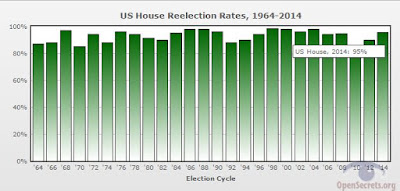Divided We Stand United We Fall (The Dividist Papers) |
| No, the GOP will not lose the House. Not even if Trump loses in a landslide of biblical proportions. Posted: 04 Apr 2016 08:36 AM PDT A recent Cook Political Report excited Democrats and terrified Republicans by invoking the specter of a wave election flipping the House of Representatives majority control - "House Republicans Staring Into the Abyss: 10 Ratings Changes Favor Democrats": "So many assumptions have been wrong this cycle that it's difficult to be definitive about another: that the House majority won't be in play in 2016. Republicans are sitting on their largest majority since 1928 - 247 seats to 188 - meaning Democrats would need to pick up 30 seats, a daunting challenge given the GOP's immense redistricting advantage and the vaporization of swing districts. But all cycle, Democrats have daydreamed about Republicans nominating an extremely polarizing presidential candidate, and suddenly it's almost certain they will get their wish... if November does turn into a Democratic rout, it's impossible to know just how bad it could get for Republicans sharing a ballot with Trump or Cruz."The primary evidence offered by columnist David Wasserman was a shift in the Cook Report Rating for 10 seats (5 D, 5 R) with each seat ratcheting one notch in the Democrats direction. But, there is far less here than meets the eye. First, note that, even among the 10 seats flagged in this report, there is a grand total of one rating change that reflects a change in party and that one (IA-03) moves from "Leaning R" to "Toss-Up". The rest are shifts within either Democratic or Republican "Solid", "Likely", "Lean" categories. That is a long way from the 30 seats needed to flip the majority. Second, the report itself offers a daunting list of reasons why it is incredibly unlikely that Republicans will lose the majority, including:
"...anything from an extremely close race to a total Clinton blowout seems possible in November ... A Trump or Cruz nomination wouldn't guarantee a down-ballot disaster for the GOP ... it's impossible to know just how bad it could get for Republicans sharing a ballot with Trump or Cruz."Net net, They're saying "We have no f*****g idea." So, let's check in on other favored polling sites, where we find older data but similar uncertainty: Nate Silver's Five Thirty Eight: "We just don't know how nominating Cruz or Trump would affect down-ballot Republicans. It could end up being a complete disaster, like it was for the GOP in 1964. It could, however, mean very little."Larry Sabato's Crystal Ball: "Democrats need to net 30 seats to win back the majority, so this projection suggests the Republicans are in very good shape to win control of the House for the fourth straight election. Again, the presidential race could scramble this. The Democrats' chances of retaking the House are tiny, but we'll keep the window cracked open in case of extraordinary circumstances."The status of the House is an important consideration for the Dividist, as the GOP retaining the House majority is the linch pin to the 2016 Divided Government voting strategy. Looking again at the Cook Report, it occurs to the Dividist that Wasserman's statement "past presidential blowouts... haven't led to dramatic sea changes in House seats" begs the real question. To whit: What parameters have led to flipping the majority in the House? The Dividist looked at this question and believe we have found a better answer. First and foremost, some context. We start with the crushing incumbency advantage in the House of Representatives. From Open Secrets: Pundits generally ascribe the paradox of voters hating Congress but loving and reelecting their individual representative to Tip O'Neill's famous dictum "All politics is local." But as we've seen recently (2006 and 2010) the dictum is only true until it's not. The corollary to O'Neill's maxim is that flipping the House requires a nationalized "wave" election. Now, let's look to history and see if we can find a common thread where conditions were right to precipitate such a nationalized wave. Consider the following chart from Wikipedia:
Since the turn of the previous century, spanning the last 116 years, the House has flipped majorities in exactly eight elections - 1910, 1918, 1930, 1946, 1952, 1994, 2006 and 2010. In every single case, without exception, there was a Unified One Party Government with President, Senate and House majorities in control of the opposite party before the voters flipped the House majority. Let's repeat that: In every single instance where the United States House of Representative has flipped majorities in the 20th and 21st centuries, it has been with an opposite party unified government in place as a necessary (but not sufficient) condition before the flip. The interpretation of this phenomena is pretty clear. A nationalized i.e. - not politics is local - election requires a national focus to energize the voters. A sufficient "wave" election needs an organizing principle to power the kind of tsunami that can flip the House. Blaming a unified party in power does the trick. A divided government distributes the blame and blurs the electoral focus. A divided government cannot drive a sufficient nationalized election groundswell to overcome local favorites and local politics. We conclude that, as we've stated repeatedly, a one party unified government is a necessary but not sufficient condition to flip the House majority. Still, a unified government can remain in place for many years without a reaction against the concentrated one party rule. Additional factors, above and beyond one party unified government rule must come into play to precipitate a wave election. In general it takes an additional combination of corruption, overreach and/or arrogance on the part of the unified party in power to align voters in opposition and nationalize the House election. In 2016 we are in the sixth year of our current iteration of divided government. The necessary condition of a single party unified government simply does not exist to permit the kind of focused wave election that will flip the House. Some will make the case that a Trump or Cruz nomination is so far out of the mainstream and so repugnant to the electorate that they will reflexively vote Democratic and reinstate Democrats to the House majority. But we have 116 years of history to support our contention that the Republican House majority is a solid lock in 2016. We'll take that bet. Americans are perfectly capable of splitting their vote and voting to divide the government. We can deliver a decisive landslide against a huckster like Donald Trump, and at the same time vote our GOP representatives back to Congress. Not a problem. Democratic Party hopes for winning the House majority in 2016 is an exercise in wishful thinking. Cognitive Madisonianism is the American Way. |
| You are subscribed to email updates from The Dividist Papers. To stop receiving these emails, you may unsubscribe now. | Email delivery powered by Google |
| Google Inc., 1600 Amphitheatre Parkway, Mountain View, CA 94043, United States | |



No comments:
Post a Comment